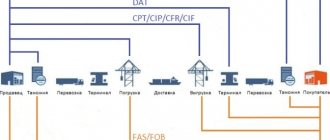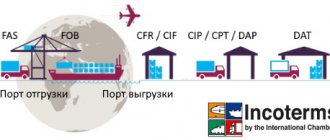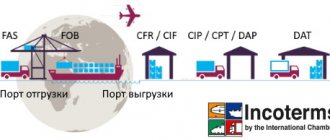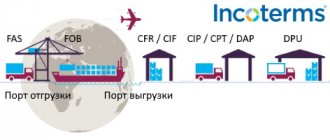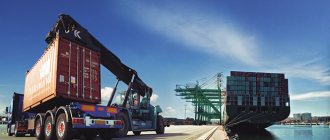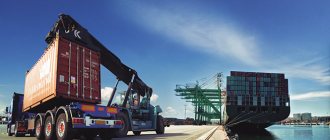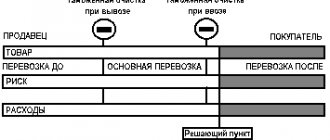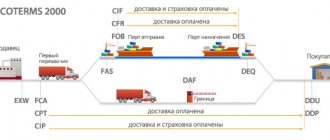- Responsibilities and risks of the seller
Go to the list of all Incoterms terms
International trade is based on Incoterms. Until January 1, 2011, the 2000 rules were in effect. From this period, when conducting foreign economic activity, it is necessary to be guided by the terms of 2010. They are relevant for both 2021 and 2021.
There are a total of 11 terms on the basis of which a foreign trade contract is drawn up. They are divided into 4 groups. Group F, which regulates legal relations between counterparties in the event of non-payment of the main transportation, includes one of the terms - FOB. We will reveal it in this article.
The term FOB is used only for transportation by sea or river watercraft.
What does FOB mean: decryption
The term FOB literally stands for “ Free On Board ”, which literally means “ Free on Board ”. In simple terms, the seller can be considered to have fulfilled his obligations after the goods have passed the ship's rail and are on the ship. From this moment on, the costs of securely placing the cargo on board, unloading it upon arrival at the port of destination, and further transportation to a warehouse or store are borne by the buyer.
It is important to indicate the place of delivery as accurately as possible, for example, FOB Astrakhan port, Astrakhan, Russian Federation.
Payment upon provision of information
At the request of the Seller, the Buyer must provide him with information and documents, unless this is a trade secret. For cooperation, it will be useful to send copies of documents paid for by the Buyer if it is assumed that both parties should have these documents.
Assistance must be provided by the Seller in obtaining documents and information, but the costs of this shall be borne by the buyer, in addition to export clearance and related documents. INCOTERMS FOB is an excellent basis that helps in organizing international transportation. But, despite this, the contract must still be spelled out in detail and simply.
Confusing language should be avoided. Any attempt to complicate the contract does not benefit either party, but rather causes distrust.
The transaction will take place safely if the agreement is correctly drawn up, and neither party will or will be able to use tricks that overshadow the cooperation.
Basis and terms of delivery FOB
According to Incoterms 2010, the exporter must prepare the goods for export, obtain all the necessary documents for it and deliver it on board the ship.
After this, in accordance with the delivery conditions, the rights and risks for the cargo are transferred to the importer, including obtaining an import permit and paying customs duties in the country of arrival.
Basic conditions also apply to domestic transportation, for example, when it is necessary to deliver goods from Moscow to Samara by river transport.
Decor
What do you need to know about this? The terms of the FOB contract provide for the preparation of a number of permits and licenses. If you are the buyer of the goods, then you are responsible for all costs associated with cargo clearance in the country of import and transit. If you are the seller, you must provide, at your own expense, the export clearance required by the delivery dates. Other formalities necessary for the removal of cargo are also borne by the seller. If the registration is carried out by a third party or third-party organization, then the relationship with him should not in any way affect the fulfillment of obligations to the buyer.
When is it better to use FOB terms?
Since FOB involves delivery on board a vessel, it is advisable to use this term in the following cases:
- The seller has the opportunity to transport the goods and load them onto the ship with minimal risk and cost. For example, it is profitable to sell products in this way to organizations located in close proximity to port cities or that have established efficient logistics to the port.
- The goods are sold in bulk, in bags and in other packaging that does not require enclosing it in a container, because It is more convenient that in the latter situation, responsibility and risks for the products are transferred to the buyer already at the moment of loading the container for delivery to the port.
- The buyer rents an entire ship or orders a charter flight. With large volumes of foreign trade turnover, it is profitable to deliver on FOB terms.
For example, in the south of Russia, large agricultural enterprises export grains and cereals in bags or in bulk on FOB terms. In advertisements for the sale of goods, such enterprises often indicate the ports of Novorossiysk and Astrakhan as the place of loading on board the vessel.
Coal, wood, scrap metal and other products are regularly exported from Russia abroad on FOB terms.
It is important in the contract to indicate the terms of loading onto the vessel and the responsibilities of the parties in case of failure to fulfill obligations. Thus, the supplier suffers losses if the buyer does not provide transport in a timely manner and the cargo has already arrived at the port. You need to pay for its storage. The opposite situation also happens: the ship is at the appointed place, but the cargo has not arrived. If this point is not specified in the contract, the buyer will have to bear extra costs.
Excessive storage of cargo at the port - indicate the buyer’s responsibility in the contract. It is he who must charter the ship and deliver it on time.
The seller is also interested in loading and sending the export to its destination as quickly as possible. Otherwise, until the goods cross the border and there are documents confirming export, you cannot count on a VAT refund.
Expenses
This point deserves special attention. FOB delivery terms also include the following costs:
- transportation of goods to the port of export (paid by the seller);
- forwarding and loading (the supplier bears the costs);
- sea freight (paid by buyer);
- unloading and port forwarding at the port of import (calculated by the customer);
- delivery and forwarding to the point of customs clearance and unloading (paid by the customer).
Above is a classic cost distribution scheme. However, there are several ports in the world where FOB terms stipulate that loading on board is at the buyer's expense. All terminals in the United States operate according to this scheme.
In the next edition of Incoterms, these conditions may be displayed separately, however, at present it is better to check with the shipping agent at whose expense the loading is carried out.
Now that you have become familiar with the main features of FOB delivery conditions, you should consider the mechanism of interaction with partners. The buyer's main responsibility is to pay for the goods on time. The main responsibility of the seller is to place the goods at the disposal of the customer and attach all accompanying documents.
Responsibilities and risks of the parties
As noted above, responsibilities for delivering goods on FOB terms are distributed approximately evenly, and both the seller and the buyer occupy the same positions.
Responsibilities and risks of the seller
The general obligations of the seller include the presentation of the goods and accompanying documentation:
- Bill of Lading;
- Commercial invoice;
- Licenses and certificates for cargo if necessary.
Obtaining an export license and quality certificate is the prerogative of the seller. He also bears the costs in this direction.
The seller’s responsibilities and risks also include the delivery of cargo to the port and its loading onto the ship. Until this moment, he is responsible for the integrity and safety of the cargo.
As for expenses, the seller:
- Pays export state duty and fees;
- Bears the costs of product packaging, inspection, labeling;
- Transports cargo to the port.
Upon arrival at the destination, the seller notifies the buyer. The form and method of this operation should also be specified in the contract.
The main responsibility is to provide the buyer with goods of appropriate quality and timely deliver them to the port of departure.
Buyer's responsibilities and risks
The buyer's main obligation is to pay for the goods in full, according to the purchase and sale agreement. In addition, he needs:
- Obtain an import license, certificate, etc. if necessary;
- Pay the state duty, taxes and fees required by the country where the cargo is imported;
- Charter the vessel on time;
- Accept delivery of goods on board in a timely manner;
- Ensure that the cargo is placed in the hold of the ship or in another place intended for transportation;
- FOB insurance is the buyer's responsibility if he believes it is necessary.
The buyer is fully responsible for the goods not only when they are loaded onto the ship, but also in some other cases:
- Upon arrival of the cargo at the port, if the buyer has not informed the seller on which vessel it will be loaded;
- The ship he chartered did not arrive at the loading point on time, on the day or period specified in the contract. Upon expiration of the term, the seller relieves himself of risks and obligations for the goods;
- Acceptance of cargo was stopped ahead of the time specified in the contract.
The timeliness of loading depends on the vessel arriving at the port at the agreed time. Choose a reliable sea carrier!
Transfer of ownership and risks
Transfer of risks and transfer of ownership according to the rules of Incoterms and the Civil Code of the Russian Federation are not equivalent concepts.
According to the first regulatory act, risks pass from the seller to the buyer from the moment the goods are delivered to the ship or after the time when the ship should have arrived at the port, for example.
The Civil Code of the Russian Federation interprets this provision differently: the buyer’s ownership rights arise when the goods are transferred to him under a contract. In practice, the provision means that if the buyer untimely chartered the ship and, as a result, the seller was unable to load, then the buyer does not have ownership of the goods.
Are you sure that FOB terms are right for you?
Fill out the form and we will select the most favorable conditions for you
Free consultation
You can also write to us by email or call our toll-free number:
8
EXW (Ex Works)
This is the most profitable delivery basis for the seller , since its terms imply the least liability for him.
How this is applied in practice: after the shipper has sold his goods, all delivery conditions - logistics, transport, warehouse - fall on the shoulders of the buyer. The recipient of the shipment then contacts the logistics company, provides the factory address and requests delivery to the final destination. At the same time, he indicates whether he needs to carry out customs clearance of the cargo using a forwarding company or whether he has his own customs representative - a broker.
The Chinese market interprets the term EXW ambiguously. Thus, a Chinese supplier can sell goods on EXW terms, but at the same time give free delivery of the goods to one of the consolidation warehouses in China. But these will still be EXW conditions, since he does not clear his cargo through customs.
Another advantage of this scheme is that the consignee controls his cargo at every stage. This is very convenient, but more expensive, since the price of the product does not include any logistics.
An important point: it is necessary to indicate the address of the plant or factory from where you want to pick up the goods - this affects the cost of delivery in China and the final price of the goods.
FOB price
When calculating the final cost of the goods, it is recommended to take into account how the price works out when delivered on FOB terms, for example, when you need to transport cargo from China to Russia. So, the totals are as follows:
- Purchase price of the goods;
- Packaging, labeling;
- Obtaining licenses and permits;
- State duty and other customs duties, taxes (import and export);
- Transportation costs to the port of departure;
- Vessel charter;
- Loading and placing goods on the ship;
- Unloading at the port of arrival;
- Payment to the carrier upon transportation to a warehouse or store.
There may be other costs associated with importing. Therefore, you need to carefully calculate the budget so that, ultimately, delivery on FOB terms is beneficial and profitable for both the seller and the buyer.
Product preparation
All responsibilities regarding packaging and labeling of goods fall on the Seller. Moreover, the packaging of the goods should prevent it from deteriorating during transportation. The carrier must monitor the quality of the cargo packaging when accepting the goods. If any other means are needed to secure it, the Seller will have to provide them.
Before the cargo is secured in the container and sealed, the Buyer may require inspection of the goods. This will need to be specified in the contract. If the contract does not say anything about this, then the costs of the inspection will be paid by the Buyer.


